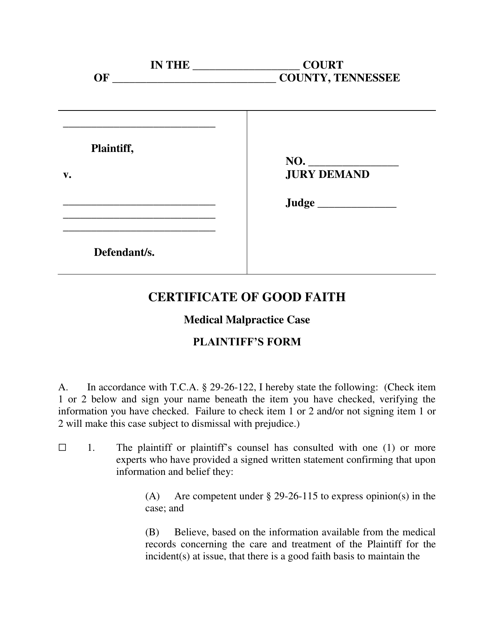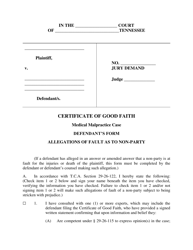Certificate of Good Faith in Medical Malpractice Case - Plaintiff's Form - Tennessee
Certificate of Good Faith in Medical Malpractice Case - Plaintiff's Form is a legal document that was released by the Tennessee State Courts - a government authority operating within Tennessee.
FAQ
Q: What is a Certificate of Good Faith in a medical malpractice case?
A: A Certificate of Good Faith is a legal document that verifies the plaintiff has consulted with a medical expert who believes there is a valid basis for the medical malpractice claim.
Q: Why is a Certificate of Good Faith required in Tennessee medical malpractice cases?
A: Tennessee law requires a Certificate of Good Faith to ensure that the plaintiff's claims in a medical malpractice case have been reviewed by a qualified medical expert.
Q: Who needs to provide the Certificate of Good Faith?
A: The plaintiff (the person filing the medical malpractice lawsuit) is responsible for providing the Certificate of Good Faith.
Q: What information is included in the Certificate of Good Faith?
A: The Certificate of Good Faith typically includes the name and qualifications of the medical expert who reviewed the case, their opinion on the merits of the claim, and a statement that the expert believes the claim has merit.
Q: What happens if a plaintiff fails to provide a Certificate of Good Faith?
A: If a plaintiff fails to provide a Certificate of Good Faith within the required time period, the court may dismiss the medical malpractice lawsuit.
Q: Can a plaintiff use any medical expert for the Certificate of Good Faith?
A: No, the medical expert providing the Certificate of Good Faith must meet certain qualifications set by Tennessee law, including being knowledgeable and experienced in the relevant medical field.
Q: How long does a plaintiff have to file a Certificate of Good Faith in Tennessee?
A: In Tennessee, the plaintiff generally has to file the Certificate of Good Faith within 90 days from the date the defendant files an answer to the lawsuit.
Q: Can a plaintiff obtain a Certificate of Good Faith after the initial filing?
A: Yes, if a plaintiff is unable to obtain a Certificate of Good Faith within the initial filing period, they may request an extension from the court.
Q: Can the defendant challenge the validity of the Certificate of Good Faith?
A: Yes, the defendant has the right to challenge the validity of the Certificate of Good Faith and present their own evidence to dispute it.
Q: Is the Certificate of Good Faith required in all medical malpractice cases in Tennessee?
A: Yes, in Tennessee, a Certificate of Good Faith is generally required for all medical malpractice cases to ensure that the claims are based on sufficient evidence and expert opinion.
Form Details:
- The latest edition currently provided by the Tennessee State Courts;
- Ready to use and print;
- Easy to customize;
- Compatible with most PDF-viewing applications;
- Fill out the form in our online filing application.
Download a printable version of the form by clicking the link below or browse more documents and templates provided by the Tennessee State Courts.







